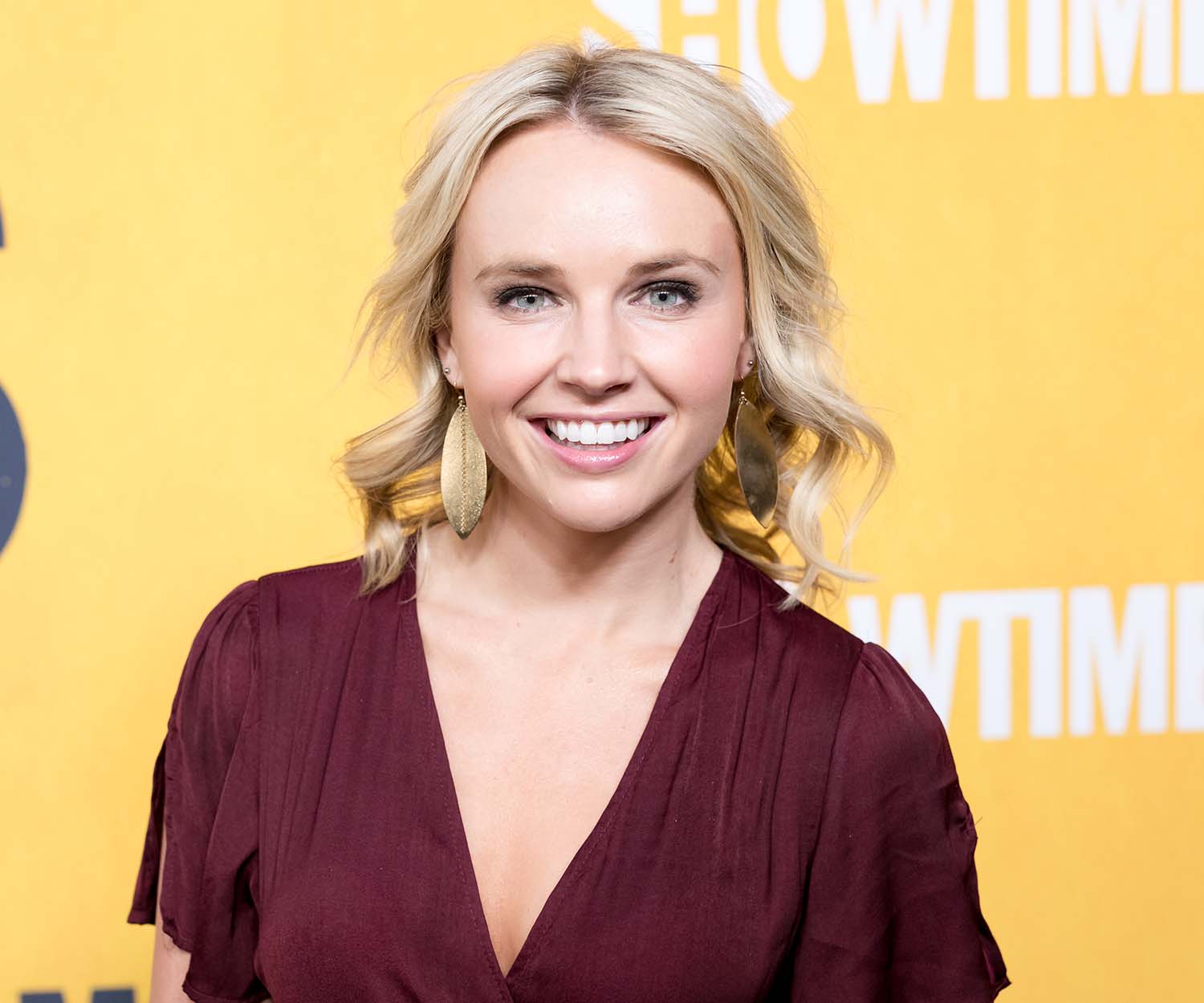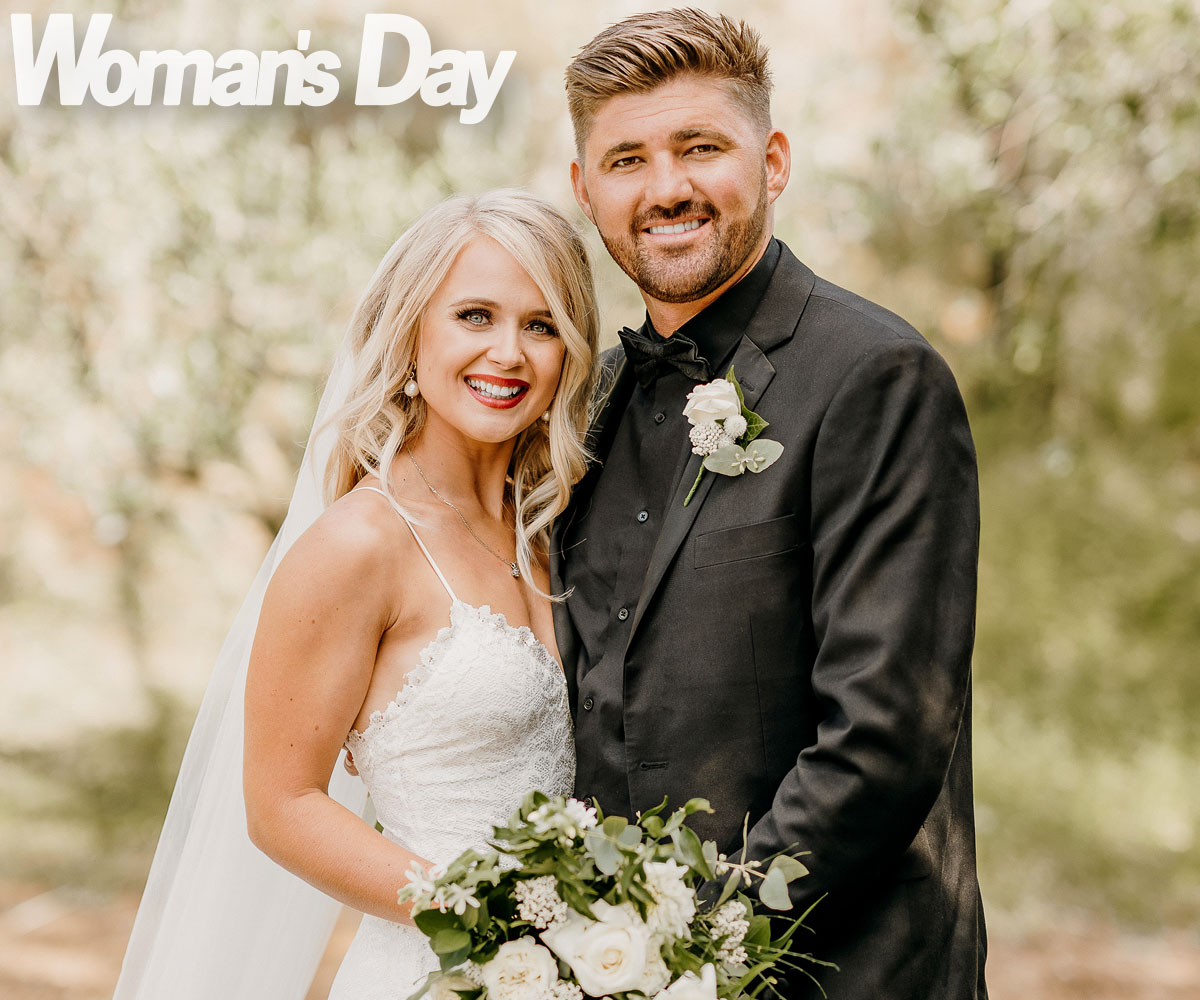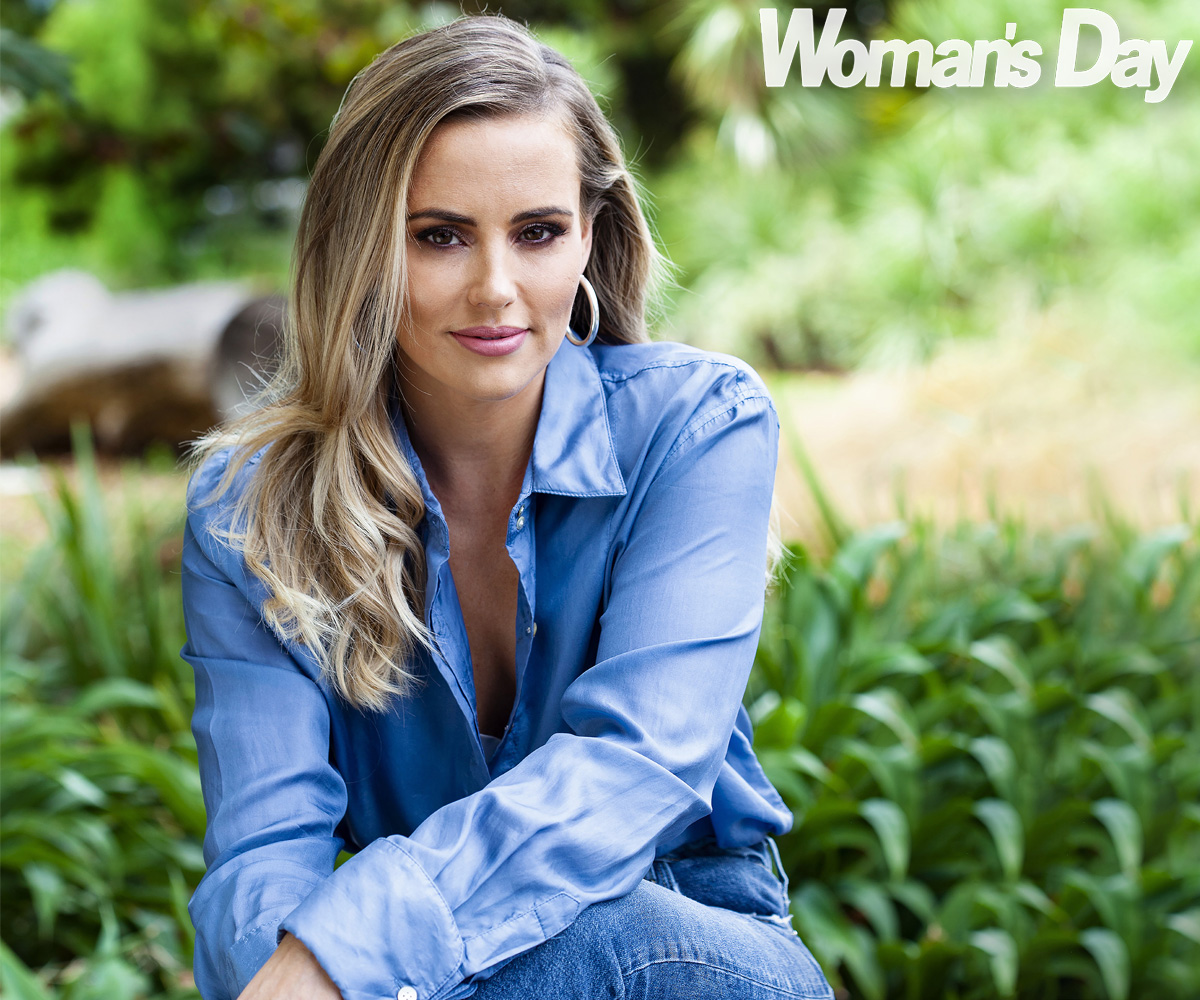“Look over to the right, and look thoughtful,” instructs our photographer.
“Should I look like I’m thinking about my depression?” Kimberley Crossman deadpans, then adopts a dramatically furrowed brow.
It’s a moment that beautifully sums up the dual nature of the exuberant 29-year-old, and the complexities of mental health. Kim, sunny and radiant in a peach-coloured dress, couldn’t appear more removed from the damp, grey cloud that can be the reality of living with depression.
And yet, like so many New Zealanders, keeping her thoughts on track is a daily process. It’s this dichotomy that Kim is aiming to address in her new podcast, Pretty Depressed, where she talks to well-known people about their mental health.
The need to look after her own mental health became a pressing reality for Kim halfway through last year. Like so many people (and, in particular, so many women), Kim has always seen being busy as a matter of pride.
For the past few years, she has been based in Los Angeles, working both there and back in New Zealand as an actor – she took 17 trips home in 2019. But the wheels were starting to fall off.
“I’d been trying for nine months to get my head space right,” she says of her decision to see an Auckland-based psychologist last year.
“I wasn’t very well physically or mentally and I knew that because my thoughts had changed, my behaviour had changed… I thought I’d go and get some help. And then I was diagnosed with being burnt out and also being pretty severely depressed.”
“I didn’t quite know how to receive that information, because I’m not a sad person. It just highlighted my lack of knowledge about what depression is.”

Kim is quick to offer a self-deprecating eye roll about her situation.
“I know I’m not reinventing the wheel here: ‘Oh, I’m an artist and I have depression, what a unique take on life,'” she laughs.
But as much as working as an actor in Los Angeles sounds like the stuff gold-dusted dreams are made of, the reality can be completely different.
She’s working as a freelancer in an industry that is as challenging and volatile as it is exciting and creative.
Los Angeles, in a way, is its own gilded sword for an actor: a hub of possibility and stardom that can also feel isolating and competitive.
The biggest difference between her life in LA and her life in New Zealand, Kim says, is that she’s not lonely here.
“I have familiar faces here, and there’s a comfort level to that. There’s an element of loneliness in the States, when you don’t have things or people that you’ve known for a long time.”
But the seductive nature of Hollywood is hypnotising.
“There is an air of possibility that life can change in an instant,” Kim says. And more importantly, she really, really loves her job. There is
no love/hate relationship when it comes to acting.
“I never hate it. That’s probably half my problem – I love it so much; more than living my life. The time between action and cut is when I’m the most present, when everything else in my mind silences,” she explains.
“I don’t know how to execute that in my real life, because it’s such an addictive feeling.”
But that all-consuming enthusiasm was taking over her life, and not in a good way.
“My psychologist’s advice was that because a lot of what was going on was tied to the work I’m doing, and the travel I’m doing, that if that’s not going to change, then something else is going to have to change. So I stop doing what I love and go and live a zen life with a stable job… and at this stage in my life, that’s not an option to me. One, because I have no transferable skills,” she laughs.
“And two, because this is what I love.”

However it turned out her skill as an entertainer was, in fact, immediately transferable to the world of podcasts.
Kim had already mentally bookmarked the name Pretty Depressed for a possible future storytelling/stand-up comedy gig, but the idea morphed when she was approached by her friend and fellow actor Kevin Connolly, from the popular US series Entourage, who had opened a podcast studio and wanted to know if she had any show ideas.
Kim fired off a list of topic ideas, including one for Pretty Depressed, which was the one she didn’t really want to do.
“There was some trepidation and nerve, about me not really having a grasp on my own situation and then offering to go and expose a wound that I hadn’t wrapped up nicely.”
Naturally, that’s the idea he picked.
“After thinking about it, I realised it was the right decision to do it because it did terrify me.”
She decided the podcast would be a series of interviews with people she had worked with or known over the years who were also on a mental health journey of their own.
It would be a chance to demystify a topic that can seem very scary or isolating. Before she was diagnosed with depression, Kim believed – as many of us do – that it meant an inability to go about a normal life.
“Something I’ve now learned is that two things can be true at the same time, that you can live in a duality. You can be a happy, bubbly person and simultaneously have moments of deep struggle and self-doubt.”
It was hard to grasp that she could be depressed, when she would go to work and enjoy seeing everyone and be fine and happy, and then back home “if I’m left alone long enough, open all the doors to this really negative self-talk and just undo all the good that has happened hours earlier.”
It was her constant, negative inner dialogue that was the warning sign that she wasn’t in a good place mentally, Kim says.
“Understanding that depression doesn’t always mean being so sad you can’t get out of bed, it can mean what your constant thought processes are… Realising that ‘oh, not everyone has a horrible voice inside their head.’ I thought we were all complete a***holes to ourselves internally, but no!”
Even though she was diagnosed in Auckland, Kim says therapy is very much part of normal life in Los Angeles.
“If you don’t go to a therapist, it’s seen as irresponsible,” she says.
“That’s LA specific – and I do understand people who think, ‘oh, they do all this heebie-jeebie stuff in LA,'” – she waves her hands around dramatically – “and don’t get me wrong, they do,” she laughs.
“But therapy provides self-awareness to know what your triggers are. Essentially, I think it’s a way to take responsibility for yourself.”
The cast of characters she has enlisted for the podcast are an interesting mix of familiar names, including New Zealand’s own Rhys Darby and The Sopranos actress Jamie-Lynn Sigler, who is battling multiple sclerosis.
“They’re people who have been there for chapters of my life and I’m getting the chance to talk to them and dive in; to hear their story, but also see how they navigate their ups and downs. I just wanted to talk to them and see what that journey has looked like for them, to get and also give a better understanding of not only where I’m at, but learn tools that my friends and family can also apply.”
Whether listeners are going through a mental health battle, or they know someone who is, it’s a part of life that we can all experience, Kim says.
“We all go through seasons in life and whether we want to call it depression or not, we’ve all gone through big highs and big lows in life. I’m just trying to understand it more.”
Doing the interviews for the podcast also gave Kim a better framework for how we should respond to people who are asking for help.
When she reached out to loved ones following her own diagnosis, she was often met by well-meaning advice that wasn’t all that helpful; go for a run or travel less, for example.
This is because, as a society, we still tend to view depression as something that just requires a “fix”, as if it’s the brain version of the common cold. Whereas in reality, mental health issues are more of a squirrelly, complicated thing to pin down – and the causes can be just as vast as the solutions.
“If anything, it made me feel more isolated. That wasn’t anyone’s intention, of course, but what it felt like was someone going, ‘It’s not my problem, you need to go and do this, this and this.’ Whereas what I wanted was someone to ask questions: ‘What does it feel like? What kind of things do you need? How can I help, or how can I be better?’ But I didn’t have the emotional intelligence to articulate or ask for that.”

Right from when Kim started acting on screen at age 15, as precocious Sophie McKay on Shortland Street, she knew it was a fantastic opportunity she would have to work hard to protect.
“I wanted longevity in my career… and I understood that I didn’t just want to be known as ‘Sophie’.”
She also took to heart the idea that she should use her new platform to do good, and try to stand for something, which led to becoming an ambassador for both the SPCA and World Vision.
Last year, Kim travelled to India as part of her work with World Vision, to visit her three-year-old sponsor child Megha, as well as promoting the campaign 1000 Girls, which is aiming to get one thousand girls sponsored.
She went to Biha, where 40 per cent of girls are married while under-age and therefore miss out on education, presenting a report for Three’s current affairs show The Project, where she is a regular collaborator.
Having many strings to her presenting bow has ensured that Kim always has work on the go, even when she’s in between acting jobs, but conversely means that there is very little time when she doesn’t have to be “on”.
“My life is very spontaneous, which is cool, but it’s also very unpredictable. So there is the issue of having to have your life organised to a point that you can suddenly get on a plane with two hours’ notice, or quickly read a script and drive across town for an audition. Everything has to be malleable in your life to allow for the last minute things.”
Los Angeles is very much home for now – she has put down roots, living with a partner, two cats and a tarantula, called Prince Harry O’Connor (the tarantula, not the boyfriend).
She commutes to New Zealand often for work, stars in Three’s comedy Golden Boy, and was also filming for Leigh Hart’s satirical news show Late Night Big Breakfast.
Moving from a dramatic role on Shortland Street into comedy happened quickly and Kim’s natural comedic timing and, as she calls it, “ability to play crazy very well”, means she’s worked in US comedy shows like SMILF and the recent Netflix series, Merry Happy Whatever.
“I took my show reel to America with all of my Shortland Street stuff… some of my best dramatic acting, and it had everyone in hysterics,” Kim says, laughing about the assumption the show was a comedy.
“I was trying to be serious and they were like, ‘Oh, mate. So funny!'”
In 2018, she was a whisper away from a spectacular full-time gig, after she landed a role as a regular cast member in the spin-off to hit TV show The Middle, but the show was cancelled before it went to air.
It is, of course, not an easy industry to work in, although Kim is very matter-of-fact about it.
“The job is easy, it’s the lifestyle that’s difficult. You are choosing an unpredictable, seasonal, non-structured, chaotic job. But it is a choice. And there is bravery involved in that. For a lot of people, that uncertainty would be too much.”
Part of the issue is that Kim has always been someone who has pushed herself, and striving to the point of sickness became par for the course – being hospitalised with the flu every other year, getting eye infections at high school from studying for too long.
“At what level is it an obsession, rather than what’s driving you,” she muses.
“I’ve always thought I’m just a very driven, ambitious person and if you were to say to me, ‘Oh, you’re always so busy,’ then I would be like, ‘Compliment!’ But I don’t want to have ‘busy lady syndrome’, or be constantly rushing. I want to try to balance my life.”
In her podcast interview with Rhys Darby, she asked him: “What does your brain look like?” and he gave such an interesting, immediate answer – a six-tiered spaceship, with every door leading to a new dimension – that she asked every subsequent guest the same question.
So, what does the inside of Kimberley Crossman’s brain look like?
“It’s a woman with frizzy hair and glasses and she’s surrounded by filing cabinets, which are all close to bursting.”
She’s always waiting for the next question and “then she’ll panic and try to find the answer in one of the filing cabinets, but she can’t quite get it.”
Kim pauses, and smiles. “It’s very telling as to where I am right now. I know I possess all the tools to help myself, I’m just not sure what cabinet has the answers in it just yet.”
The Pretty Depressed podcast is available now. To find out more visit kimberleycrossman.com.



